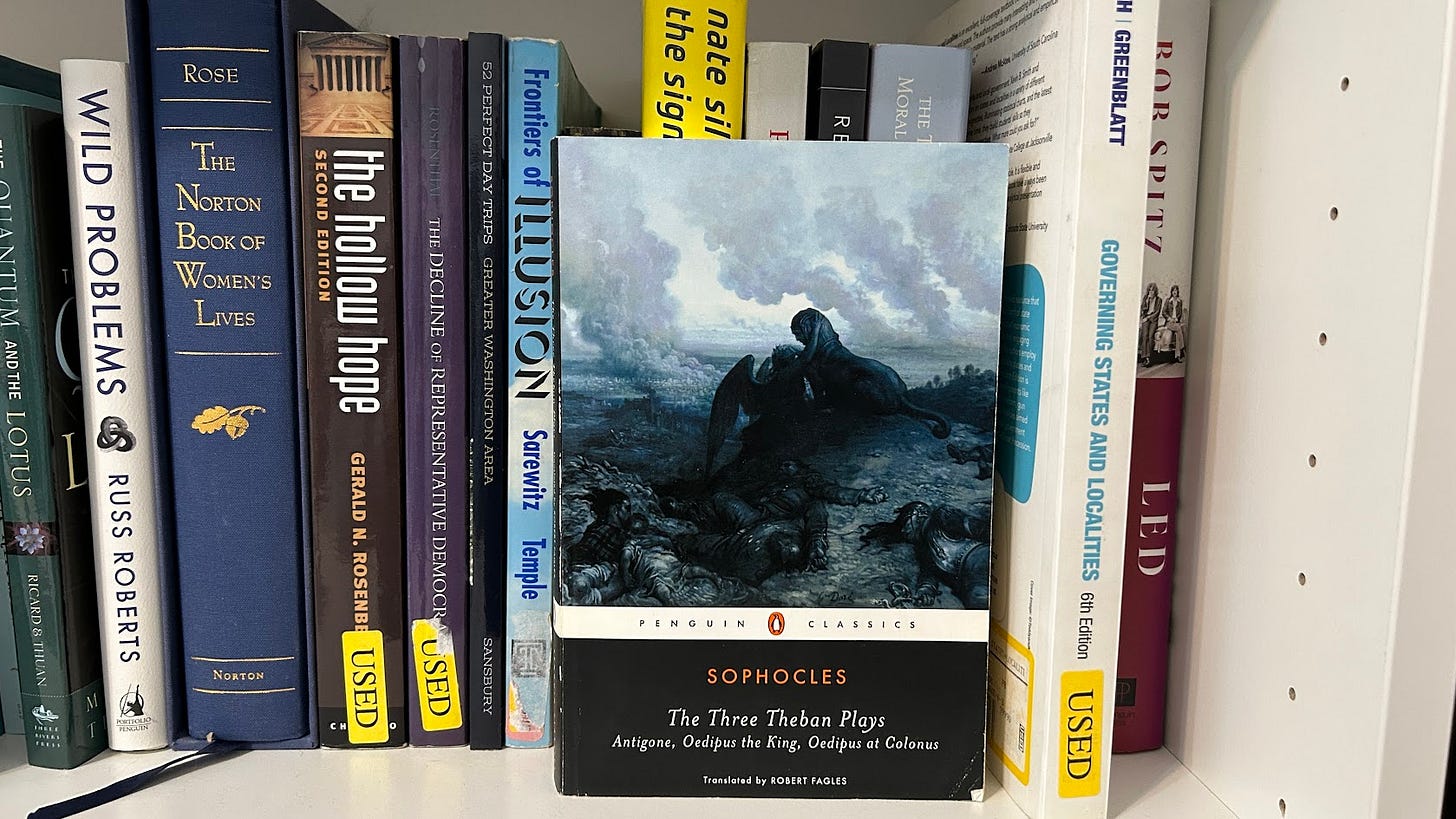The Theocratic Age: Virgil, Sophocles, Aurelius
This is part of my ongoing series on reading the Western Canon. See here for an introduction to the series.
Although Bloom’s ‘core 26’ authors start with Shakespeare (and chronologically starts with Dante), his full list of books in the Canon starts with ‘The Theocratic Age,’ with works spanning from The Bible to The Iliad to Beowulf (the full list can be found here). Although none of these authors are among the ‘core 26’, they seemed important to read to understand later works of the Canon. So, I set out to read a handful of these books, mostly ones where I recognized the author or title. Alas, I read these before I endeavored to seriously blog about them, so my notes are not as fleshed out as I would like. Still, I will write my memories and thoughts on all of the books that I have read. With that in mind, I hope you enjoy my reviews and interpretations of some of the oldest literature in The Canon.
Today: Virgil, Sophocles, Aurelius.
Virgil - The Aeneid
Virgil, writing several centuries after Homer, sets out to make is own epic for the ages. In my mind, he succeeds in rivaling and maybe even surpassing Homer. The Aeneid is consistently exciting and lucid (in contrast, I found some of Homer’s prose to be confusing or unclear), and it is filled with brilliant passages throughout the tale. I went with Fitzgerald’s translation of this one, and I found it absolutely stunning throughout.
I enjoyed the mirroring of The Iliad and The Odyssey in several respects: like Achilles’ shield in The Iliad, Aeneas also gets a shield that tells the story of his people on its face. And, we get another excellent underworld sequence, like in the Odyssey, where Aeneas and company encounter some of their ancestors.
During this underworld portion, I learned that the Romans had a belief in a type of reincarnation, at least as it is portrayed in The Aeneid. We get this cosmological passage as Anchises (Aeneas’ father) describes the journey of the soul:
…We are sent
Through wide Elysium, where a few abide
in happy lands, till the long day, the round
of Time fulfilled, has worn our stains away,
leaving the soul’s heaven-sent perception clear,
the fire from heaven pure. These other souls,
when they have turned Time’s wheel a thousand years,
the god calls in a crowd to Lethe stream,
that there unmemoried they may see again
the heavens and wish re-entry into bodies.
Now that I have read Plato, I can see how this connects to Socrates’ belief in the immortality of the soul, and it broadens my views of ancient Greek and Roman mythology about life and death.
Sophocles - The Three Theban Plays (Antigone, Oedipus Rex, Oedipus at Colonus)
I read the Robert Fagles' translations of these, and found them superb - particularly Oedipus at Colonus. I read them in all in the middle of summer, in beautiful weather, which didn’t feel quite right: these are definitely fall/winter books in my mind. The feeling I remember most from Colonus is that of a stubborn, sad, wretch of a man staring death in the face. Oedipus’ life is horrific, and in Colonus we see him reckon with fate, justice, and revenge in his final hours.
I found it very moving, as Oedipus has a kind of defeatism and sorrow that I imagine is common to many who reflect on their lives near the end. And, in his last moments, what action does he find to take revenge on those who he perceives to have wronged him? Is it to kill, or give away money, or let slip crucial information? No; his last action is his own death (by being buried where only Theseus knows, he confers a mystical boon on the people of Athens in their conquest of Thebes). It’s as if he has run out of ideas on how to save his destiny or his legacy, and instead, he turns to the one thing that comes for us all.
I’m not sure whether his death is his first and last heroic action, or if it’s just one final tragedy in a lifetime full of them.
Marcus Aurelius - Meditations
This was probably my 3rd or 4th time reading Meditations, and every time it’s just as enriching. I’m actually just about to read it again, because I found a different translation by Gregory Hays (h/t Shane Parrish from Farnam Street for the recommendation).
I think the thing that makes the Stoics more enjoyable to read is the knowledge that they clearly fell short of their ideals, and were aware of it. Aurelius wrote many of these passages for his own good, trying to convince himself to do the right thing. It’s not as if he’s declaring that he has mastered the art of stoicism, and he’s preaching his craft to the rest of the world.
The quote that comes into my mind the most frequently is “People exist for one another. You can instruct them or endure them.” It’s a persistent mantra for me, and boils down your two options when dealing with difficult people: either show them why they’re wrong and how they could be better, or accept their faults and move on. Any other option is just complaining, whining, and generally unhelpful.
I think this book is probably at the top of the list of self-help books I would recommend to anyone. It is a paradigm-shifting book, one that can truly change how you see and interact with the world.





